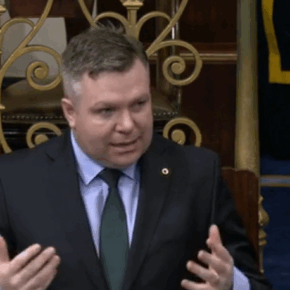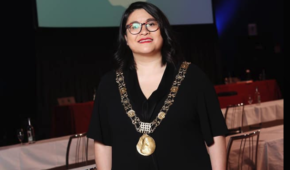Patient has sight restored as a result of new gene therapy administered at the Mater Hospital
Padraig Conlon 18 Feb 2025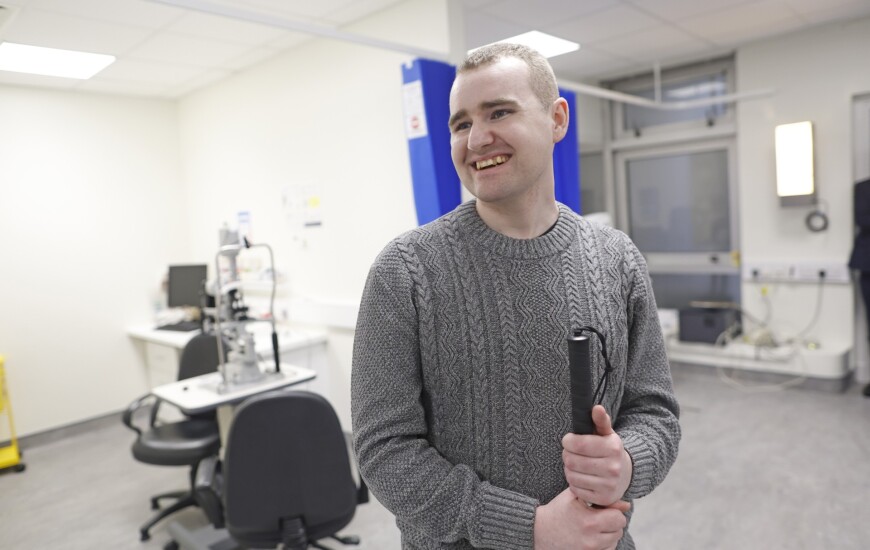
The Mater Hospital has successfully treated the first patient in Ireland with a ground-breaking ocular gene therapy.
The gene therapy, which received approval for reimbursement in Ireland last year, has the potential to restore retinal function and vision in patients suffering from inherited retinal dystrophies.
31-year-old Stuart Haxell from Sligo is functionally blind and has only been able to see a certain amount of light for over a decade.
He received the first Luxturna treatment in Ireland in November at the Mater Hospital, under the care of Professor David Keegan, consultant ophthalmic surgeon.
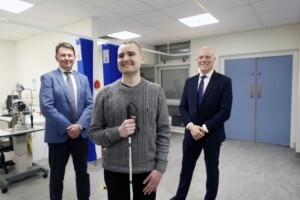
Just weeks after the procedure, Stuart is now able to read letters and words again, a recovery described by medical professionals as remarkable.
This success marks a transformative development not only for the Mater Hospital but for the treatment of inherited ocular degeneration in Ireland.
The gene therapy works by targeting genetic mutations that impair retinal function. The therapy involves:
- Identifying patients with sufficient remaining retinal structure for treatment.
- Performing a vitrectomy to remove the eye’s vitreous jelly.
- Administering a subretinal injection that creates a temporary retinal detachment, allowing the viral vector to deliver the functional gene.
- Enabling the retinal cells to produce the enzyme needed for vision restoration.
“It’s akin to plugging a television back in,” explains Prof Keegan “The procedure is most effective when administered in childhood before significant retinal degeneration occurs, but as Stuart’s case demonstrates, benefits are not only possible, but significant in adults.”
The introduction of this ground-breaking gene therapy at the Mater Hospital is the culmination of years of rigorous clinical research, specialised staff training, extensive safety protocols and critical funding support.
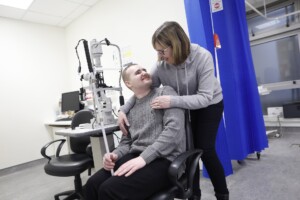
This achievement was made possible through support and consultation with key stakeholders and organisations, including Fighting Blindness, Shabra Charity, Vision Ireland, the Mater Hospital Foundation and the entire team at the Mater Hospital.
Inherited retinal dystrophies are very rare with one patient eligible for treatment identified every two to five years.
The team in the Mater is expecting to treat a second patient later this year.
The therapy has already shown remarkable results. Stuart experienced significant improvements in central vision within two weeks, with further improvements expected over time.
While his vision may not return to full capacity, in particular his peripheral vision, this advancement represents hope for the treatment of visual conditions previously deemed untreatable and non-preventable.
Describing recovering his sight, Stuart Haxell said, “For the first time in over a decade, I can see the world around me.
“Being able to read again is something I never thought possible and my quality of life has been improved. I really appreciate Prof Keegan, his team, the
Mater Hospital staff and the HSE for giving me this ground-breaking treatment and bringing sight back to me.”
Looking ahead, the Mater Hospital’s success with this gene therapy paves the way for future advancements in treating other degenerative eye diseases.
Emerging technologies, such as CRISPR-Cas9 gene editing, offer promising prospects for further innovation.
“This achievement represents a paradigm shift in Irish healthcare and ophthalmology,” said Josephine Ryan Leacy, CEO of the Mater Hospital. “We are on the cusp of transforming how genetic and degenerative eye conditions are treated in Ireland and I would like to take this opportunity to thank Prof Keegan and his team for the incredible results we are already seeing with this new treatment.
“Restoring sight and improving a patient’s quality of life is a humbling achievement and we hope to see many more success stories in the coming years.”
Finbarr Roche, CEO at the charity Fighting Blindness said, “This monumental advance gives hope to all those people in Ireland living with a visual impairment – the first treatment to reverse sight loss.
“We believe that a lot of sight loss is reversible; and this treatment is a direct result of vision research – and we firstly thank the Irish public who have contributed to vision research in Ireland and abroad.
“Stuart Haxell was identified as a suitable recipient through the database of clinical diagnoses and genetic codes that has been spearheaded by fundraising in Ireland, our Target 5000 project, for all those living with inherited retinal conditions.
“This sends a clear signal to our community and the wider public that investing in scientific research can make possible what used to be accepted as impossible.”




